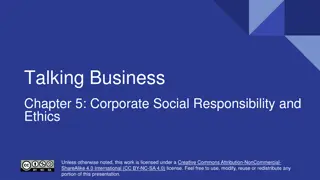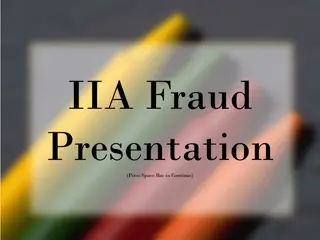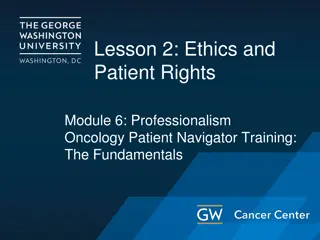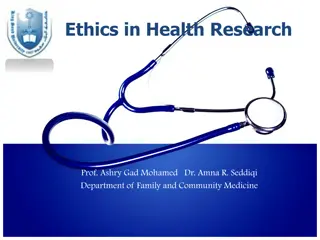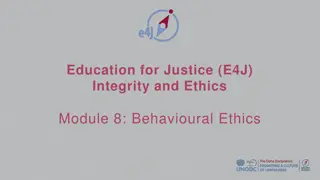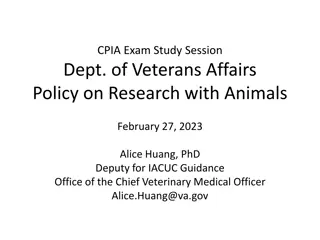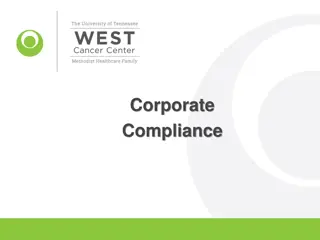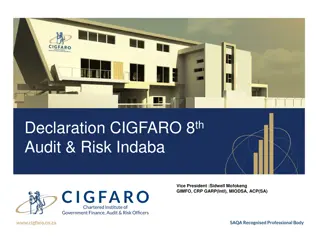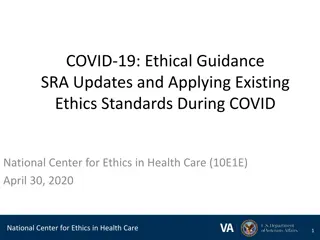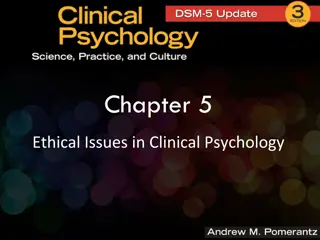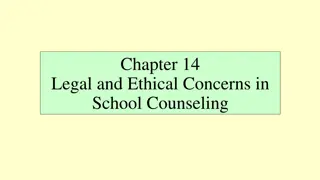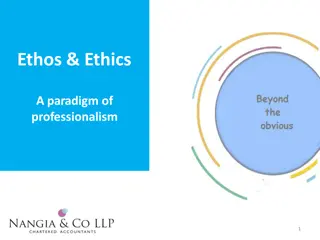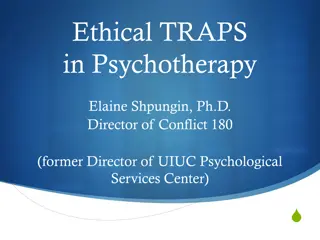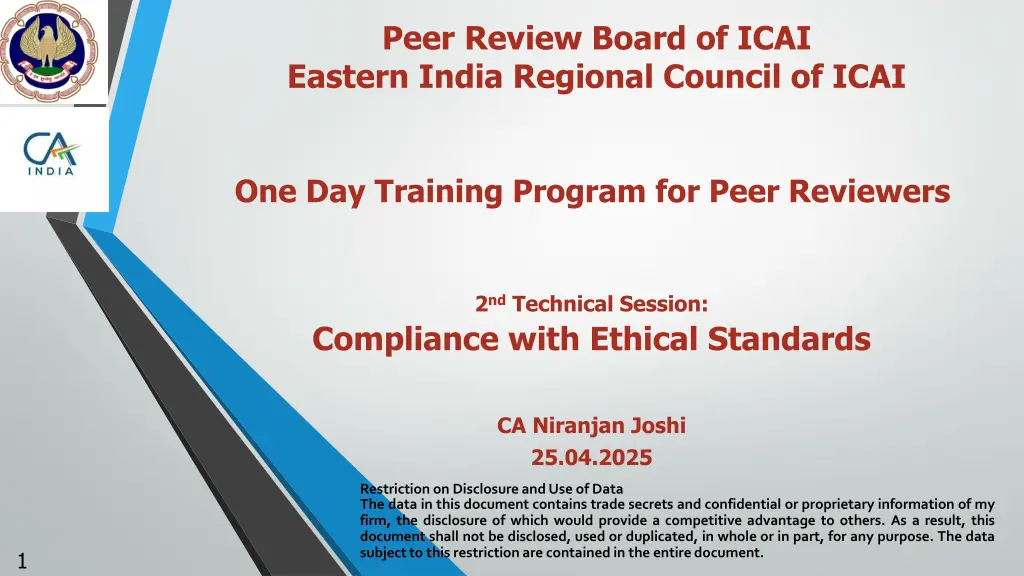
Peer Review Board Training: Compliance with Ethical Standards by CA Niranjan Joshi
"Explore the one-day training program focusing on compliance with ethical standards presented by CA Niranjan Joshi. Discover key insights on professional ethics, common lapses, and essential reading materials in the field of accountancy."
Download Presentation

Please find below an Image/Link to download the presentation.
The content on the website is provided AS IS for your information and personal use only. It may not be sold, licensed, or shared on other websites without obtaining consent from the author. If you encounter any issues during the download, it is possible that the publisher has removed the file from their server.
You are allowed to download the files provided on this website for personal or commercial use, subject to the condition that they are used lawfully. All files are the property of their respective owners.
The content on the website is provided AS IS for your information and personal use only. It may not be sold, licensed, or shared on other websites without obtaining consent from the author.
E N D
Presentation Transcript
Peer Review Board of ICAI Eastern India Regional Council of ICAI One Day Training Program for Peer Reviewers 2nd Technical Session: Compliance with Ethical Standards CA Niranjan Joshi 25.04.2025 Restriction on Disclosure and Use of Data The data in this document contains trade secrets and confidential or proprietary information of my firm, the disclosure of which would provide a competitive advantage to others. As a result, this document shall not be disclosed, used or duplicated, in whole or in part, for any purpose. The data subject to this restriction are contained in the entire document. 1
Disclaimer These are my personal views and can not be construed to be the views of the ICAI or my firm. No representations or warranties are made by the RC/Branch/Study Circle of RC with regard to this presentation. These views do not and shall not be considered as a professional advice. This presentation should not be reproduced in part or in whole, in any manner or form, without our written permission. 2 CA Niranjan Joshi
Coverage Code of Ethics Peer Review - Requirements Resources 3 CA Niranjan Joshi
Introduction Ethics / Moral Values Accountability towards self conscience Eternal Vigilance is the cost of Independence Only 1 choice Ethical or Not Ethical 4 CA Niranjan Joshi
Need for Code of Ethics Ensure Credibility of our Profession Expectation from Society / Regulators / Users 5 CA Niranjan Joshi
Common Lapses Observed Good Faith Weak documentation Work should not only be done, but it should be seen that it is done Faintest of ink is stronger than the strongest of memory Lack of Pro-activeness Lack of communication Skills can t say no Obsession with Tax Considerations 6 CA Niranjan Joshi
What to READ Updated The Chartered Accountants Act, 1949 Updated CA Regulations of 1988 ICAI publication on Code of Ethics 2019 COE FAQs published by ICAI. (February 01, 2012) Manual for members ICAI Website for various pronouncements. ESB website; CA Ethics Plus handy brochure issued by ESB. 7 CA Niranjan Joshi
Important Points to remember Misconduct proceedings - Initiated on receiving a Complaint or information from any source. There can be suo moto action by the Council. Complainant need not come with clean hands. Council not concerned with the locus standi of Complainant. Withdrawal of complaint permitted only with permission of BOD / DC. Council has jurisdiction basically over an individual member; and not over firms; or on outsiders. Complaint filed beyond period of 7 years may not be entertained at the discretion of the Director Discipline if he/she is satisfied that it would be difficult obtain evidence on account of time lag or that it would be procedurally inconvenient. Even if Respondent compensates the complainant for any losses, it will not undo the misconduct. Even if nobody is aggrieved due a particular lapse / misconduct of the member, there can be disciplinary proceedings against the member. There is no time limit for disposal of complaint! Proceedings may continue for years together! 8 CA Niranjan Joshi
Way Forward ICAI being member of International Federation of Accountants (IFAC) has considered the Ethics Standards issued by International Ethics Standards Board for Accountants(IESBA) while framing Code of Ethics for CAs. The existing (2009) edition of ICAI Code of Ethics is based on 2005 edition of IESBA Code of Ethics. ICAI Code of Ethics has been revised in January, 2019 based on 2018 edition of IESBA Code of Ethics. It is applicable from 1st April, 2020. 9 CA Niranjan Joshi
Read and Follow Code of Ethics 10 10 CA Niranjan Joshi
Fundamental Principles I Integrity O Objectivity P Professional Competence and due care C Confidentiality P Professional Behaviour 11 CA Niranjan Joshi
Fundamental Principles Integrity Straightforward and honest approach, Fair dealing and truthfulness, Do not associate with communication or information containing false or misleading information, Steps to disassociate with above information once known Objectivity Not to compromise professional or business judgment because of bias, conflict of interest or undue influence of others. Not to undertake a professional activity if it unduly influences the accountant s professional judgment. 12 CA Niranjan Joshi
Fundamental Principles Professional Competence and due care Attain and maintain professional knowledge and skill, Act diligently and in accordance with applicable technical and professional standards, Ensure appropriate training and supervision of subordinates Confidentiality Maintain confidentiality of information acquired as a result of professional and employment relationships, Disclose information when required by law or authorised by the client, Consider relevant factors while deciding disclosure of confidential information, Maintain confidentiality even after the end of relationship with client 13 CA Niranjan Joshi
FundamentalPrinciples Professional Behaviour Avoid activities that impair the reputation of the profession, Do not make exaggerated claims for services offered, and disparaging references or unsubstantiated comparisons with others, Do not advertise any professional/other facts which are in violation of Advertisement Guidelines of ICAI Threats to Avoid Self Interest Threat, Self Review Threat, Advocacy Threat, Familiarity Threat, Intimidation Threat. The Code provides a conceptual framework that professional accountants (PA) are to apply in order to identify, evaluate and address threats to compliance with the fundamental principles 14 CA Niranjan Joshi
Assessment of Threats Self-interest threat the threat that a financial or other interest will inappropriately influence a professional accountant s judgment or behaviour; [e.g. Financial Interest, Loans or Guarantees, Professional Fees leverage in excess of 40% - group fees, Business Relationship, Potential of Employment, Contingent Fees Success Fee, Other assignments non assurance] Self-review threat the threat that a professional accountant will not appropriately evaluate the results of a previous judgment made; or an activity performed by the accountant, or by another individual within the accountant s firm or employing organization, on which the accountant will rely when forming a judgment as part of performing a current activity [e.g. Performed services which is subject to his review, having previous relationships] 15 CA Niranjan Joshi
Assessment of Threats Advocacy threat the threat that a professional accountant will promote a client s or employing organization s position to the point that the accountant s objectivity is compromised; [e.g. Dealing in shares, Assignment for advocate in litigation mattes] Familiarity threat the threat that due to a long or close relationship with a client, or employing organization, a professional accountant will be too sympathetic to their interests or too accepting of their work; and [e.g. Close relationship with client, Long association, Acceptance of gifts and hospitality, Rotation of Auditors external and internal] 16 CA Niranjan Joshi
Assessment of Threats Intimidation threat the threat that a professional accountant will be deterred from acting objectively because of actual or perceived pressures, including attempts to exercise undue influence over the accountant. [e.g. Threat of replacement, Statutory Auditor cannot be Internal Auditor, Cannot be financial advisor, Independence applies to each partner of the firm.] A circumstance might create more than one threat, and a threat might affect compliance with more than one fundamental principle. Identify -> Evaluate -> Address 17 CA Niranjan Joshi
Major Changes in COE 2019 COE 2009 and COE 2019 - Five most important structural changes in new Code Independence requirements for Audit and Review Engagements and other Assurance engagements differentiated. Independence sections recharacterized Independence Standards . Change in the drafting conventions e.g. should to shall New pattern of structuring of sections Requirements distinguished. Increased clarity of responsibility for compliance - Firms, network firms, individuals within firms. as International 18 CA Niranjan Joshi
Major Changes in COE 2019 Changes from IESBA Code Changes made fall under following broad heads:- Where domestic provision stricter than corresponding IESBA provision e.g. total bar on Accounting by the Statutory Auditor Where domestic legal requirement governs the issue e.g. Network would only refer to Network registered with ICAI Where a domestic requirement has no corresponding provisions in IESBA Code e.g. Firm Rotation Language changes for example, professional accountant in business mentioned as professional accountant in service as per Chartered Accountants Act, 1949 19 CA Niranjan Joshi
Guide to the COE Complying with the Code, fundamental principle and conceptual framework Professional Accountants in service Professional accountants in public practice Independence Standards Independence for Audit and Review Engagements Independence for assurance engagements other than audit and review Part 1 Section 100 to 199 Part 2 Section 200 to 299 Part 3 Section 300 to 399 Part 4 Part 4 A Section 400 to 999 Section 400 to 899 Part 4 B Section 900 to 999 20 CA Niranjan Joshi
21 CA Niranjan Joshi
Major Changes in COE 2019 Taxation services to the Audit Clients ICAI Code Ethics, 2009: Taxation to Audit client include compliance, planning, provision of formal taxation opinions and assistance in the resolution of tax disputes. Such assignments are generally not seen to create threats to independence ICAI Code of Ethics, 2019 (604): Further guidance on Taxation matters provided. Generally, it states that providing tax services to an audit client might create a self review or advocacy threat Tax Return preparation Usually no threat Tax Calculations for the Purpose of Preparing Accounting Entries (that will subsequently be audited by the Firm) - Creates a self- review threat 22 CA Niranjan Joshi
Major Changes in COE 2019 Tax Planning /Other Tax Advisory Services Might create self- review/advocacy threat- appropriate safeguards to be adopted, E.g. Using professionals who are not audit team members to perform the service; having an appropriate reviewer, not involved in providing the service, review the audit work etc. Tax Services Involving Valuations Might perform only where the result of the valuation will not have a direct effect on the financial statements Assistance in the Resolution of Tax Disputes Might create a self- review or advocacy threat appropriate safeguards to be adopted Not to provide if involves acting as advocate for the audit client OR amounts involved are material to the financial statements on which the firm will express an opinion. 23 CA Niranjan Joshi
Major Changes in COE 2019 Documentation 2009 Code requires Firms to document their conclusions regarding compliance with independence requirements In the 2019 Code, the requirements of Documentation given in greater detail NOCLAR requires all steps in responding with NOCLAR to be documented Fees Relative Size In the revised Code, where for two consecutive years, total gross annual professional fees from the audit client and its related entities represent more than (40% non PIE/ 20% PIE) of total fees, the firm shall disclose to Those charged with Governance (TCWG)* 24 CA Niranjan Joshi
Major Changes in COE 2019 No such ceiling on total fees of the Firm would be applicable where such fees does not exceed Rs. 5 Lakhs No such ceiling on the total fees would be applicable in the case of audit of government Companies, public undertakings, nationalized banks, public financial institutions or Government appointments. Criteria of Indebtedness IESBA Code of Ethics, 2018 brought concept of materiality of Loans and Guarantees. Whether a loan or guarantee is material would depend on combined net worth of the individual and his immediate family members Concept adopted in ICAI Code of Ethics, 2019 25 CA Niranjan Joshi
Major Changes in COE 2019 In the revised Code, the application of safeguards is required, when necessary, to eliminate threats or to reduce them to an acceptable level (level which a reasonable and informed third party would conclude, is acceptable). Previously safeguards had to be considered if a threat was other than clearlyinsignificant Public Interest Entity 2019 edition contains a new term Public Interest Entity (PIE) Enhanced independence requirements for PIE in the new Code Definition of PIE , as given in IESBA Code of Ethics extended by inclusion of banks and insurance companies in the 2019 Code 26 CA Niranjan Joshi
Major Changes in COE 2019 Firms encouraged to determine whether to treat an additional entities as PIE because of large number of stakeholders. Inducements - Gifts and Hospitality Inducements elaborated To first see whether prohibited by L and R Offering also prohibited Reasonable and Informed Third Party test To see whether it is with the intent to improperly influence the behavior of the recipient or of another individual. Clarifications about appropriate boundaries for offering and accepting of inducements. Extended to PAs in service also. Total prohibition in case of Audit/Assurance clients to continue. 27 CA Niranjan Joshi
Code of Ethics FAQ Read and Follow 28 CA Niranjan Joshi
From the ICAI Website 29 29 CA Niranjan Joshi
From the ICAI Website 30 30 CA Niranjan Joshi
FAQ 31 FAQs released by ICAI related to professional ethics of members pertaining to Bank Assignments FAQ List document 31 CA Niranjan Joshi
From the ICAI Website 32 CA Niranjan Joshi
Introduction Code of Ethics Peer Review - Requirements Resources 33 CA Niranjan Joshi
Peer Review & Code Of Ethics Part B of Questionnaire requires a PU to submit information about the Ethical Requirements and Peer Reviewer has to check its compliance. Independence & Ethics Partner Quality Control Partner Updated knowledge about Ethics Requirements Adherence to Ethical Requirements by Partners & Team Steps taken to mitigate threats to independence Assignments within the specified limits (Company Audit/Tax Audit) Fees below minimum recommended Audit Fees vs Other Fees Tender Process followed 34 CA Niranjan Joshi
Peer Review & Code Of Ethics Policies and Procedures Which of the following procedures does the PU have in place for ensuring that the personnel adhere to ethical requirements those contained in the code: Designated Independence and Ethics Partner who is responsible for all aspects of independence and ethics of the PUs partners and professional staff If answer to (i) above is yes, name of the Partner Is the Partner same as QC Partner? Has the PU established a system for identifying all services performed for each client and evaluating whether any of the services impair independence? Does the PU regularly update itself with the changes in professional ethics and independence standards/ requirements? What checks are put in place to ensure that all personnel follow the independence and ethics policies of the PU? Sr. No. 1 (i) (ii) (iii) (iv) (v) (vi) 35 CA Niranjan Joshi
Peer Review & Code Of Ethics Policies and Procedures Sr. No. 2. Which of the following checks does the PU put in place to ensure that the independence requirements are communicated to its personnel: (i) Does the PU maintain a list of entities with which PU personnel and others, if any, are prohibited from having a financial or business relationship? (ii) Does the PU make the list available to the concerned personnel so that they evaluate their independence? (iii) Are the changes in the list notified to the personnel as soon as such changes occur? (iv) Does the PU provide frequent reminders of professional responsibilities to personnel? 36 CA Niranjan Joshi
Peer Review & Code Of Ethics Policies and Procedures Sr. No. 3. Which of the following policies, procedures and the safeguards the PU has in place to mitigate threats to its independence? (i) Do the Engagement Partners provide the PU with relevant information about client engagement to enable it to evaluate the overall impact on independence requirements? Does the PU provide training to partners and professional staff on what constitutes threat to independence and the safeguards that may be taken to reduce the threats to an acceptable level? Accumulating and communicating relevant information to appropriate personnel (ii) (iii) (iv) How and to whom the personnel notify of circumstances and relationships that cause threat to independence? (v) What are the steps taken by PU so that the self-interest threat to independence is mitigated? 37 CA Niranjan Joshi
Peer Review & Code Of Ethics Policies and Procedures Sr. No. (vi) How the PU is mitigating the self-review threats? Is there any checklist where the steps have been outlined? (vii) How the PU is mitigating the risk of advocacy threats? Can the PU demonstrate the same? (viii) How the PU is mitigating the familiarity threats? Can PU demonstrate the same? Is the relationship with client personal disclosed in the Independence form? Can the PU demonstrate that professional skepticism was used in the entire assignment? What measures are taken to mitigate the same? (ix) 38 CA Niranjan Joshi
Peer Review & Code Of Ethics Policies and Procedures Sr. No. 4. What policies, processes and safeguards has the PU established with regard to threats to its independence: (i) Is it ensured that the PU does not have any financial interests in audit clients, their owners and officials? (ii) Does the ethics policy of the PU emphasize that the members of PU must not have other than business relationships in audit clients, their owners and officials? Does the PU have the policy of rotating out senior personnel from the assurance engagements after a certain length of service at a particular engagement? If yes what is the length of service? Whether there is a policy that the personnel declares - the acceptance of gifts & hospitality from clients/owners (iii) (iv) (v) Does the PU have the policy to obtain annual independence declaration from all personnel? 39 CA Niranjan Joshi
Peer Review & Code Of Ethics Policies and Procedures Sr. No. (vi) As a step in the engagement program, is the Engagement Partner required to sign a compliance with independence requirements? (vii) In case professional service is conducted jointly with other auditor, is the annual independence confirmed for the other auditor? 5. Are the number of audit assignments held by the PU, at any time, more than the specified number of audit assignments: A Under the prevailing Companies Act and/or the limit prescribed by the ICAI. B Tax audit assignments as per ICAI notification 6. Has the PU accepted appointment as Statutory Auditor of PSU(s)/Government Company (ies) Listed company(ies) and other Public Company(ies) having turnover of more than Rs. 50 crores or more in a year and accepted other work or assignment or service in regard to the same entity(ies) on a remuneration which in total exceeds the fee payable for carrying out statutory audit of the same entity. (If yes, specify reasons) 40 CA Niranjan Joshi
Peer Review & Code Of Ethics Policies and Procedures Sr. No. 7. Has the PU accepted appointment as an auditor of a concern while it/he is indebted to the concern or has given any guarantee or provided any security in connection with the indebtedness of any third person to the concern, for the limits fixed in the statute and in other cases for amount not exceeding Rs.1,00,000. (If yes, specify reasons). Has the PU received fees from a client below the minimum scale of fees recommended for audit assignments by the ICAI? If yes, reason for accepting fee below recommended scales Has the PU, being statutory auditor of a client rendered any services to the same client, as mentioned in section 144 of Companies Act 2013 (if yes, specify reason with name of the entities and year in which such service was rendered) Has the PU, as incoming auditor for an entity, followed the direction given by the ICAI not to accept an appointment as auditor in the case of unjustified removal of earlier auditor? If no, reasons for non-adherence to the direction Does the PU or a Network, as a good and healthy practice, make a disclosure of the payment received by it for other services through the medium of a different firm or firms in which the said PU or Network or its partners may have an ownership interest. (If no, specify reasons) 8. 9. 10. 11. 41 CA Niranjan Joshi
Peer Review & Code Of Ethics Policies and Procedures Sr. No. 12. Has the PU followed the Guidelines issued by the ICAI in respect of engagement/(s) procured through Tender? 13. Is the website of the PU in conformity with Institute's guidelines/ directions issued on posting of particulars on website by Practice Unit(s)? Whether your firm has been reviewed by: The Quality Review Board (QRB) Financial Reporting Review Board (FRRB) Any regulator (Pls. specify) If yes, details as under: Year of Review / Name of Entity / Broad description of deficiencies / Date of submission of compliance report (wherever required) Have any Government Bodies/ Authorities evaluated the performance of the firm to the extent of debarment/ blacklisting? 14. (i) (ii) (iii) (iv) 15 42 CA Niranjan Joshi
Introduction Code of Ethics Peer Review - Requirements Resources 43 CA Niranjan Joshi
44 CA Niranjan Joshi
Questions 45 CA Niranjan Joshi
CA Niranjan Joshi, B.Com., FCA, DISA (ICAI) Email: nvjca1@gmail.com Cell: 8369577210 46

